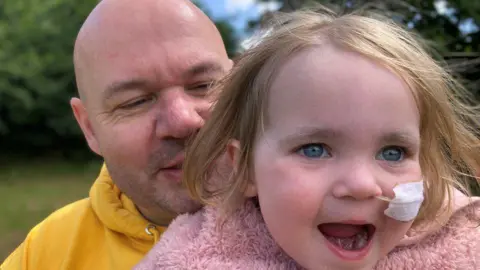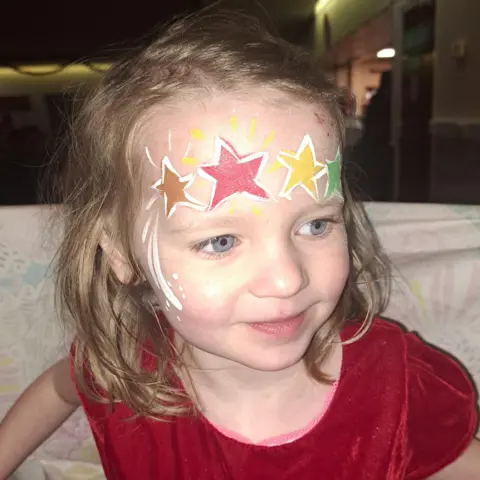'Every giggle is thanks to her donor family'
 BBC
BBCThe family of a girl who had a life-saving heart transplant are calling for organ donation to be taught to schoolchildren in a bid to raise awareness and increase consent rates.
Now four, Beatrix, from Burnopfield, County Durham, spent more than a year in Newcastle's Freeman Hospital on a waiting list.
Her parents Terry and Cheryl believe having lessons focused on the issue would lead to more youngsters discussing it with their families.
The government said a wide review of the curriculum was under way to ensure youngsters had "access to a broad and balanced" range of subjects.
Under a law which came into force in England five years ago, people over 18 are presumed to have consented to their organs being donated after their death unless they had opted out, although relatives are consulted and can still block donations.
However, the law relating to children is different with parents of under-18s given the opportunity to provide consent on their child's behalf.
Terry and Cheryl would like to see organ donation taught in primary and secondary schools in an age-appropriate way as they believe it would lead to further conversations at home.
'Protective instinct'
The couple know both sides of the situation having granted donor consent in 2018 when another of their daughters, Isabel, was still-born.
While Cheryl agreed, Terry initially refused because he had never given the subject any consideration.
 Family handout
Family handout"The moment doctors ask is extremely traumatic," he said. "It's the worst possible time because you're grieving.
"When we lost Isabel, a protective instinct kicked in and I didn't want anyone to touch her.
"It took Cheryl to make me think about other people and I realised we would hopefully be saving other parents from experiencing the same feelings we had.
"I'd never talked about it before, but Cheryl had. That's why education around donation is vital - conversations can plant a seed that lasts a lifetime.
"They're difficult to have, but children understand the concept of saving lives.
"At four years old, Bea understands she has what she calls a 'special heart' that she got from someone else."
'One moment in time'
Terry and Cheryl are backing a campaign by Orgamites, a global organ donation and health education programme, which provides teaching materials for schools.
"Teachers talk about what a heart or a liver or kidney is, how people can look after them and how you can save people by passing organs from one person to another," Terry explains.
"Children can then have further conversations at home with their parents."
While clear he believes the law introduced in England in 2020 for over-18s is a "great step forward", he says further measures are needed.
He adds: "Every day Bea was in hospital [before her operation in June 2023], we wondered whether it would be her last.
"Who knows what life will bring her, but every breath she takes, every tear or giggle is owed to one moment in time when a family were asked to give consent and said 'yes'.
"We think about her donor family all the time. When I read her a story, take her to the playground or check on her sleeping at night, it's because of them and their decision.
"I'll never have sufficient words to thank them."
'Change needed'
Orgamites said that while the opt-out law for adults had helped raise awareness around organ donation, it was "not the quick fix many assumed".
It added: "It also does not apply to children and, on its own, has not led to the widespread behavioural change needed to significantly boost donation rates."
There are currently 277 children in the UK waiting for an organ transplant, according to the NHS.
That includes 141 who need a kidney, 76 a liver and 43 a heart transplant with many children on the waiting list relying on organs from a child who has died.
A Department for Education spokesperson said: "High and rising standards are at the heart of the government's mission to break down the barriers to opportunity and give every child the best start.
"The independent, expert-led Curriculum and Assessment review is considering how to ensure young people have access to a broad and balanced curriculum that ensures young people leave school ready for work and ready for life."
The opt-out system for adults has been in place in Wales since 2015 and in Scotland since 2021.
